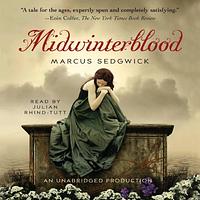Take a photo of a barcode or cover
mysterious
medium-paced
It's 2073 when Eric Seven arrives at Blessed Island and from the start, something just feels...off. And although the people he meets while beginning his research are friendly enough, he can't shake the idea that he's missing something or, more accurately, like maybe these somethings have happened before. It doesn't take long until we, the readers, realize that Eric and the woman he meets, Merle, have known each other in other lives. At each phase of the moon, in different periods of time, Eric and Merle are reincarnated and their paths cross in ways both beautiful and frightening.
This is a cleverly devised novel, to be sure. Almost like a series of short stories threaded together through these two people. The island itself is creepy and intriguing and the writing is succinct and lovely (also, sometimes I little freaky). So many adjectives I'm using, yes? While I wasn't completely blown away (I think I always wanted more from their "love" story), it's the first time in a long time that I wanted to read while pushing the stroller, I was that engaged. That's four stars to me.
This is a cleverly devised novel, to be sure. Almost like a series of short stories threaded together through these two people. The island itself is creepy and intriguing and the writing is succinct and lovely (also, sometimes I little freaky). So many adjectives I'm using, yes? While I wasn't completely blown away (I think I always wanted more from their "love" story), it's the first time in a long time that I wanted to read while pushing the stroller, I was that engaged. That's four stars to me.
adventurous
challenging
dark
emotional
mysterious
reflective
tense
medium-paced
This was a confusing book at first, similar to [b:The Incarnations|23492504|The Incarnations|Susan Barker|https://d.gr-assets.com/books/1439787175s/23492504.jpg|27676544] by Susan Barker. The novel is divided into seven parts, in reverse chronological disorder. Each part follows the incarnations of Eric and Merle, which took me about three parts to get because I was stuck on the assumption that Merle was immortal. I'm telling you now, that dragon flower tea is a red herring.
If you're checking this book out for its horror aspect, heads up: The Vampire part is very creepy. Probably my favorite out of all seven. That said, this book was very well-written. The pacing was good, and the characters were interesting.
If you're checking this book out for its horror aspect, heads up: The Vampire part is very creepy. Probably my favorite out of all seven. That said, this book was very well-written. The pacing was good, and the characters were interesting.
2.5 stars if I could. Slow confusing start, decent middle, intense but unfulfilling end.
I found this book very compelling in spite of not being able to make sense of it for a good chunk of the time. I liked it way more than I expected to. Somehow I went into it thinking that this was creepy or that it was horror. Instead it was just an extended bit of the mysterious.
I love the idea of the same souls reappearing throughout history and being drawn to each other again and again, yet filling different roles. It makes for an interesting examination of relationships and emotional intimacy to imagine the same two people in all these different dynamics — romantic, familial, platonic — though for the same reason it borders a bit on creepy and incestuous. Still, if done well I think it's a very comforting theme, the idea that this life isn't the only one where our loved ones will be close to us.
It's not that it's done badly here, I just didn't find it all that engaging. Though very different in many ways, it's hard not to compare this to [b:Cloud Atlas|49628|Cloud Atlas|David Mitchell|https://d.gr-assets.com/books/1406383769s/49628.jpg|1871423], which is perhaps unfair (and gives it very big shoes to fill) but, as I said, difficult to avoid. That, too, is about reincarnation of sorts, a collection of seemingly unrelated short stories tied together in surprising ways. And that, too, takes its title from a work of art which is created in one of the stories and pops up in others. But where Cloud Atlas shines is how distinct and dimensional each setting feels, to the point it's almost literally unbelievable that they were all written by the same author. Midwinterblood, on the other hand, feels exactly the same throughout, in settings 1000+ years apart. Sure, the plot elements are different, but as far as the actual writing — including dialogue — for the most part there's not even much change in voice when it switches from third- to first-person POV. Which is extra unfortunate for me since I found the writing style alternately bland and grating.
There are other comparisons I could make (as well as to other works like Lost, "The Lottery", and Legends of Tomorrow — no idea why all the L's — and even Slaughterhouse-Five with the repeating phrase "Well, so it is"), but I don't want to harp too much on that, especially since I also wasn't crazy about two of the aforementioned works. I'll just say that perhaps I would have enjoyed this one more had I not already read Cloud Atlas. If this concept is entirely new to you and Cloud Atlas seems too daunting, then you might like this one.
I will say that once or twice I was drawn in by some element or creeped out by a plot twist, but mostly the "twists" were either predictable for me or simply not that satisfying when they were revealed. And that's probably just because I didn't feel that engaged with the characters. Being a very character-centric story, at the very least Erik and Merle needed to be far more interesting than they are. It feels like they're carried mostly by the concept — "Oh, so that's how Merle fits into this story" — rather than any actual dimension or development. And being that the main thrust of the story is how inevitable their connection is, I never even really felt that!
Finally, as other reviewers have mentioned, I have no idea why this is labeled YA. It's not YA. That's not to say it might not appeal to young adults, but the story neither centers around nor is geared toward teenagers. There are teen or preteen characters a couple times, but that doesn't make it YA.
It's not that it's done badly here, I just didn't find it all that engaging. Though very different in many ways, it's hard not to compare this to [b:Cloud Atlas|49628|Cloud Atlas|David Mitchell|https://d.gr-assets.com/books/1406383769s/49628.jpg|1871423], which is perhaps unfair (and gives it very big shoes to fill) but, as I said, difficult to avoid. That, too, is about reincarnation of sorts, a collection of seemingly unrelated short stories tied together in surprising ways. And that, too, takes its title from a work of art which is created in one of the stories and pops up in others. But where Cloud Atlas shines is how distinct and dimensional each setting feels, to the point it's almost literally unbelievable that they were all written by the same author. Midwinterblood, on the other hand, feels exactly the same throughout, in settings 1000+ years apart. Sure, the plot elements are different, but as far as the actual writing — including dialogue — for the most part there's not even much change in voice when it switches from third- to first-person POV. Which is extra unfortunate for me since I found the writing style alternately bland and grating.
There are other comparisons I could make (as well as to other works like Lost, "The Lottery", and Legends of Tomorrow — no idea why all the L's — and even Slaughterhouse-Five with the repeating phrase "Well, so it is"), but I don't want to harp too much on that, especially since I also wasn't crazy about two of the aforementioned works. I'll just say that perhaps I would have enjoyed this one more had I not already read Cloud Atlas. If this concept is entirely new to you and Cloud Atlas seems too daunting, then you might like this one.
I will say that once or twice I was drawn in by some element or creeped out by a plot twist, but mostly the "twists" were either predictable for me or simply not that satisfying when they were revealed. And that's probably just because I didn't feel that engaged with the characters. Being a very character-centric story, at the very least Erik and Merle needed to be far more interesting than they are. It feels like they're carried mostly by the concept — "Oh, so that's how Merle fits into this story" — rather than any actual dimension or development. And being that the main thrust of the story is how inevitable their connection is, I never even really felt that!
Finally, as other reviewers have mentioned, I have no idea why this is labeled YA. It's not YA. That's not to say it might not appeal to young adults, but the story neither centers around nor is geared toward teenagers. There are teen or preteen characters a couple times, but that doesn't make it YA.
This is one I kind of wished I had not listened to on audiobook and instead read the print book. It was pretty confusing.
I liked this book, at first I found it odd but progressively I learned how to appreciate it through the pages. The writing was beautiful, and I find the world and atmosphere created by the author quite unique. Seven stories are told in this book and they all intertwine in some way at the end. Overall it was good, but there were some moments where I didn’t feel connected, or I wasn’t really concerned about the characters. I liked the relationship between Eric and Merle through the different stories, especially the idea that they were different all the time. But unfortunately, I didn’t feel so much connected to all of the characters.
I still find it interesting, and I am really looking forward to read another work by the author because I really liked his writing.
I still find it interesting, and I am really looking forward to read another work by the author because I really liked his writing.
Very cool connections to be found in this year's Printz winner. A little bit creepy, and haunting but it had me searching for the links in the stories the whole way through.
Summary: Seven linked vignettes unfold on a Scandinavian island inhabited--throughout various time periods--by Vikings, vampires, ghosts, and a curiously powerful plant.
Summary: Seven linked vignettes unfold on a Scandinavian island inhabited--throughout various time periods--by Vikings, vampires, ghosts, and a curiously powerful plant.




